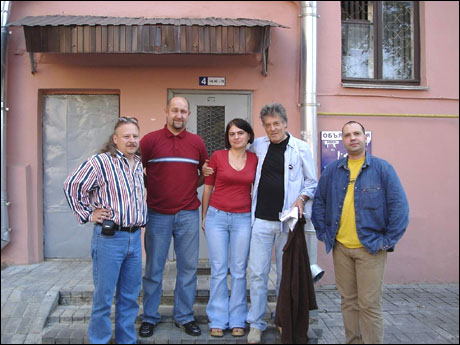|
The tradition of Belarusian theatre is very ancient. It has started
in the early middle ages as folk puppet theatres - Batlejka - and folk drama (usually
biblical and knighthood plots), played during different seasonal celebrations. In general
all of the traditional Belarusian celebrations and games have a theatrical element. During such holidays as
Kaliady, Kupalle, Maslianitsa - folks are dressing as fantastic animals and persons
enacting different strange situations. Who would think for example of setting up a
humorous burial and wake?!
Later this tradition was refined in
a Renaissance Belarus which was at the time the cultural center of the Grand Duchy
of
Lithuania. Multitude of the Belarusian cities had a Magdeburg Right with growing
population of traders and craftsmen who needed entertainment. The powerful
Belarusian
gentry (magnats) had their own court theatres where Italian singers and French actors were
invited to perform. For example at the height of its flourishing the Slonim Opera and Ballet Private Theatre of Ahinski
aristocratic family had 300 performers! The ballet troop of Slonim theatre later served as
a nucleus for a famous St. Petersburg Mariinski Theatre that started Russian school of
ballet.
Today theatre is very popular in
Belarus. I have been visiting the international theatrical festival in Hrodna
("Baltic Spring") and the theatres were completely sold out even during
the hard times in which we are now!
Belarusian Theatre News

“My impressions from the visit to Belarus differ from
impressions which I had in the Soviet Union and the Czech Republic: the
fear is hidden inside,” told the acclaimed British playwright after
his visit to Belarus. Tom Stoppard visited Minsk from August 28 to
September 2 on personal invitation of the director of the project
“Free Theater” Natalya Kolyada and playwright Nikolay Khalezin. The
great British dramatist, together with the former president of the Czech
Republic Vaclav Havel and American playwright Arthur Kopit, is one of
the trustees of the project “Free Theatre”. On one of the days of
the visit Tom Stoppard met representatives of the civil initiative
Charter’97, the youth resistance movement “Zubr”, students of the
Belarusian Humanitarian Lyceum, intellectuals.
-
Accidental tyranny
Saturday October 1, 2005
The Guardian
Belarus
is one of the most repressive and bizarre regimes in Europe. But Tom
Stoppard, on a recent trip to the capital, Minsk, found a thriving
opposition and a hunger for art that challenges the 'national psychosis'
...In the audience of 70 people, two or three cameras clack and flash, even when, finally, the actors are stripped to black thongs. There is no stage, no set. The play ends in candlelight.
watch me vanish
watch me
vanish
watch me
watch me
watch
It is myself I have never met, whose face is pasted on the underside of my mind
please open the curtains
The actors blow out their candles. The performance is over, and the lights beam on to the national psychosis that is the present condition of Belarus, a country with more policemen per capita than anywhere else in the world and a feeling that no one knows where it is."
 Free
Theatre website - renown Belarusian underground theatre that has earned so
many critical acclaims and is known quite well in Europe. Free
Theatre website - renown Belarusian underground theatre that has earned so
many critical acclaims and is known quite well in Europe.
 "Our
Theatre" Belarusian theatrical web portal - theatrical news,
schedules, announcements, etc. "Our
Theatre" Belarusian theatrical web portal - theatrical news,
schedules, announcements, etc.
Below are the links to pages on Belarusian Theatre:
 Theatre
"Free Scene"
("Vol'naia Scena"), also here
and here. Theatre
"Free Scene"
("Vol'naia Scena"), also here
and here.
 The
National Academic Yanka Kupala Theatre, also here The
National Academic Yanka Kupala Theatre, also here
 Theatre
of Belarusian Dramaturgy Theatre
of Belarusian Dramaturgy
 National
Belarusian Ballet Theatre National
Belarusian Ballet Theatre
 The National Academic Opera Theatre of
Belarus The National Academic Opera Theatre of
Belarus
 The Yakub Kolas Academic Drama Theatre
plays Belarusian repertoire The Yakub Kolas Academic Drama Theatre
plays Belarusian repertoire
 The
State Puppet Theatre of the Republic of Belarus The
State Puppet Theatre of the Republic of Belarus
 The National Academic Drama Theatre named
after M.Gorky plays Russian repertoire The National Academic Drama Theatre named
after M.Gorky plays Russian repertoire
 Republican
Theatre of Belarusian Drama Republican
Theatre of Belarusian Drama
 Hrodna
Voblasc' Drama Theatre Hrodna
Voblasc' Drama Theatre
 "Yavaryna"
- the Early Theatre in Belarus "Yavaryna"
- the Early Theatre in Belarus
 IV
Minsk festival of mono-plays «Я»
("Me") IV
Minsk festival of mono-plays «Я»
("Me")
|
 Belarusian Theatre
Belarusian Theatre This file is a part of
the Virtual Guide to Belarus - a collaborative project
of Belarusian scientists and professionals
abroad. VG brings you the most extensive compilation of the information about Belarus on
the Web.
This file is a part of
the Virtual Guide to Belarus - a collaborative project
of Belarusian scientists and professionals
abroad. VG brings you the most extensive compilation of the information about Belarus on
the Web.